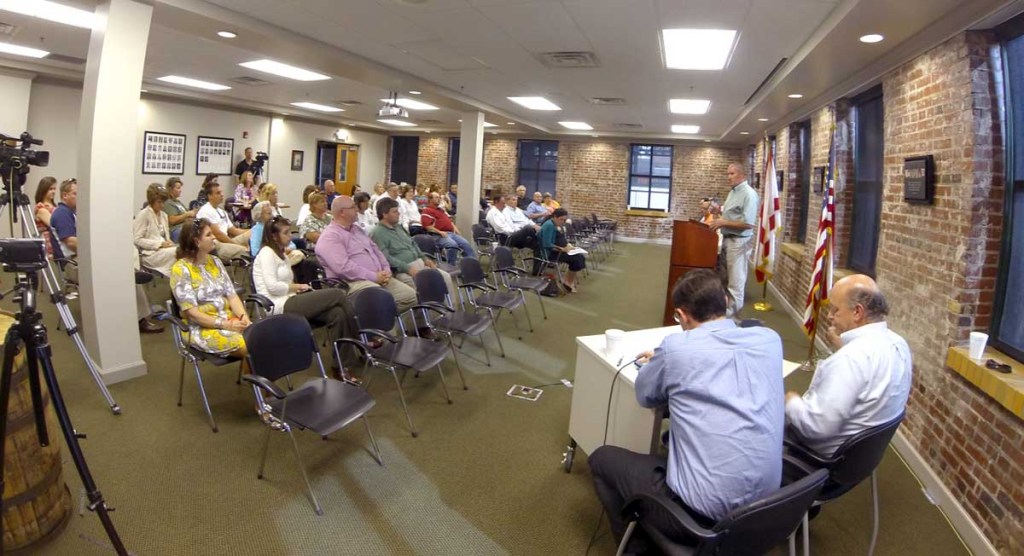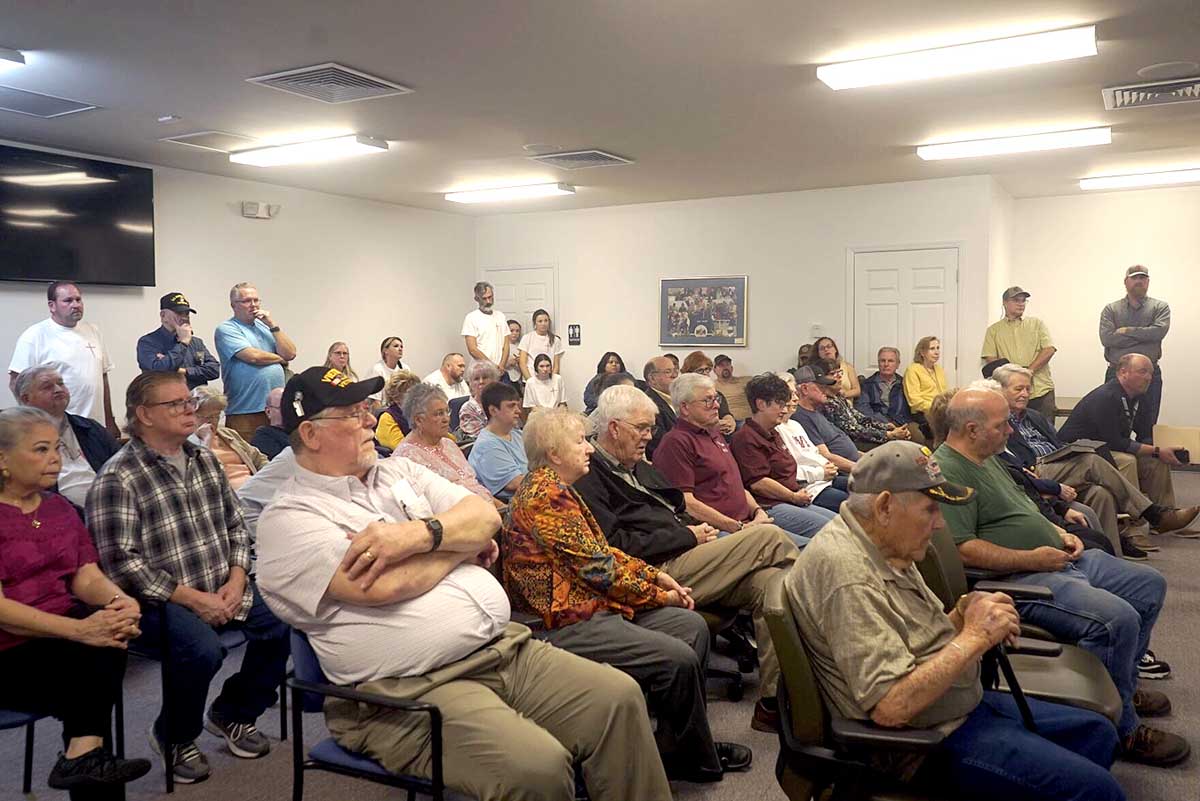Roads, nepotism, sheriff’s meal money headline commission forum (WITH VIDEO)
Published 9:07 am Wednesday, May 7, 2014

- The Cullman Area Chamber of Commerce and The Cullman Times hosted the forum for the seven candidates running for county commission ahead of the June 3 primary. Incumbent Place 1 Associate County Commissioner Darrell Hicks is seeking a second term against Republican challenger Kerry Watson while incumbent Place 2 Associate County Commissioner Stanley Yarbrough is facing a field of four other Republicans: James Graves, Gary Marchman, J.P. White and Doug Williams. Moderators Brian Lacy, who serves on the chamber’s governmental affairs committee, and David Palmer, Times editor, each asked three questions. Lacy led off with what candidates hope to accomplish if elected.
From money to repair crumbling roads and feed county inmates to political nepotism among the workforce, candidates for Cullman County Commission exchanged their opinions on a wide variety of issues during a political forum Tuesday.
The Cullman Area Chamber of Commerce and The Cullman Times hosted the forum for the seven candidates running for county commission ahead of the June 3 primary. Incumbent Place 1 Associate County Commissioner Darrell Hicks is seeking a second term against Republican challenger Kerry Watson while incumbent Place 2 Associate County Commissioner Stanley Yarbrough is facing a field of four other Republicans: James Graves, Garry Marchman, J.P. White and Doug Williams.
Moderators Brian Lacy, who serves on the chamber’s governmental affairs committee, and David Palmer, Times editor, each asked three questions. Lacy led off with what candidates hope to accomplish if elected.
‰ Graves: Associate Commissioners runs the county. You’re watching over the budget in addition to taking care of roads. You’re doing industrial development and recruitment. You’re coordinating with city economic development and our county economic development department. I’ve traveled to Washington D.C. to meet with our representatives to get funding. If elected, I’d continue what I did before and work with our cities and other municipalities.
‰ Marchman: I’d say the big thing is good management and good planning. We’ve got to look down the road and manage our assets. We’ve got to look at the plans we put in place. We’ve got to improve morale of county workers. We’ve got to use common sense and spend every dollar like it’s our last. We’ve got to have department cohesion. I’ll have an open door policy and maintain community involvement.
‰ Hicks: I’d like the commission to continue working in harmony. That’s been a real asset over the past four years. I’d also like to see some projects we’ve started get completed: the Duck River Dam, the ATRIP projects like the new interstate interchange at County Road 222 and paving of county roads. My record speaks for itself as far as an open door policy.
‰ Watson: After four years, I’d like people to look back and say I was a commissioner that always worked for the people. That I was honest, fair and straightforward.
‰ White: A man doesn’t know what he can or can’t do until he gets there. I will work as hard as I can every day. I’m not going to make promises, but I will work with anybody.
‰ Williams: I’ll also have an open door policy. I’ll address your concerns and make sure your voice is heard. I’ll continue to work with other communities and I’ll always have your best interests at heart.
‰ Yarbrough: I’ll keep unity on the commission and work with municipalities. You can’t grow unless you’re unified and that’s what we’ve done. I want to help Cullman County grow for the future.
Palmer’s next question asked if candidates think the current three-member commission format is the best form of government.
‰ Hicks: Whatever citizens want, I’ll be for. I don’t like commissioners running from districts; I think since we’re making decisions that affect the entire county, commissioners should be voted on countywide.
‰ Marchman: It should be up to the people, but there are positives to both the three-man and five-man commission. I like that you would have a representative from your area with the five-man commission. But it couldn’t be a part-time job. If we went to that, I’d like to see us rotate the chairman seat among the five districts every nine months.
‰ Watson: I would stand by what the people wanted. As far as part-time or full-time, we’d have to discuss that when it got to that point.
‰ White: I think with three people, there’s more of a tendency to get along. I’ve seen where larger commissions have a lot of arguing and bickering. I think we would need to do the research and bring out all the facts before we changed.
‰ Williams: I’m opposed to it. I think limited government is good government. I would leave it up to the voters though.
‰ Yarbrough: If voters wanted it, I’d be for it. But I agree with Mr. Williams in that small government is good government. Let’s research it.
‰ Graves: There are advantages and disadvantages to both. Each commissioner has hundreds of roads to ride, and voters want to meet their commissioner. I don’t think you could do it. In other places where they rotate the chairman seat, it is a fiasco, and I would be completely against that.
Lacy asked candidates what they could do as commissioner to enhance revenue sources for the county.
‰ Marchman: I think we’ve got to educate businesses that want to relocate here about the benefits of Cullman County. I think we’ve got to work closely with the existing businesses. Agriculture has a $2.4 billion economic impact here with 15,500 jobs directly affected by it. We’ve got to support that too.
‰ Watson: I’d work with our city and county economic development departments and the chamber to business and industry. I think we need to bring in new businesses and industry to keep our young people here. We’ve got great assets in Wallace State and the Vinemont trade school. We could have our own homegrown workforce.
‰ White: First, you’ve got to have quality leaders in the positions. A lot of things flow in the right direction when you have that. I’ll work with our state in recruiting industry. Industry wants to know the place they’re coming to… that the county government is solid. You’ve got to put the best people in best places we can.
‰ Williams: We have everything we need to enhance revenue: Adequate water supply, access to the interstate and a well-educated workforce. I’ll continue to work with the commission to keep those good things going.
‰ Yarbrough: I will continue working with our towns and cities and bringing in industry by being unified with our chamber and economic development office. We’ll work together to make sure everyone has a job in Cullman County.
‰ Graves: Sales tax and property tax are your two biggest revenue sources for the $50 million budget. You’ve got to keep raising that up. Industrial recruitment is great for us, and I will continue to pursue that.
‰ Hicks: A growing economy is the best way to raise revenue. It takes everyone working together. Best example of that is the interstate interchange at County Road 222. We came together with a plan to finance it. Good management of county money is another way. A good example of that is the county road department going to a unit system. We’ve saved $1 million a year doing that. We’re going to continue looking at things like that.
Palmer asked candidates if they thought the county commission should take over managing funds to feed inmates housed at the detention center.
‰ Watson: I would have to do some research to see what the commission could legally do with that.
‰ White: The system has been setup this way for many years, and I know the current sheriff has spent a lot of that money on projects and scholarships. I don’t think it’s my right to tell him what to do with that money. I think the sheriff used it in the proper way. And if that’s changed, it doesn’t need to happen on a county level, but a state and possibly federal level.
‰ Williams: I don’t know anything about that issue.
‰ Yarbrough: If the county bid the food, it would cost taxpayers three times as much than what the sheriff is paying. If the sheriff can save money, then he can spend the money to buy equipment and vehicles for his department.
‰ Graves: When I came to the county in 1996, the county commission handled the jail food, and it was chaos. Then the sheriff at the time Tyler Roden came to us and said “Let us have the money, and we can take it over and deal with it.” We copied what a lot of counties are doing. The law allows him to keep the excess. When Mike Rainey came in, he said he didn’t want anything to do with it, but I encouraged him to take it because as a commission we could never afford to buy him the vehicles like he could do with the excess money. I support it the way it is a 1,000 percent.
‰ Hicks: I’m in total agreement with Mr. Graves. I’ve heard horror stories when the commission had it, what a great expense it was. By letting the sheriff handle the food money, he has the discretion to use to any leftover money to purchase whatever he needs.
‰ Marchman: I’m all for keeping our law enforcement top-notch, but to allow one man to have that control over that much money is not a situation he needs to be in. I don’t think the commission should take it over but I have to ask, why is there so much excess? If there is, then we’re not managing our money right. That needs to be looked at closely. The sheriff’s department has five other discretionary funds besides the food money.
Lacy asked candidates what they could do about the perception of nepotism among the county workforce.
‰ White: If there is an opening, I think you should hire the best person. It should be left up to the supervisor to fill the position with the most qualified person.
‰ Williams: I don’t believe in the buddy-buddy system. I think it is wrong. It’s dirty. I think you should hire the person for the job experience.
‰ Yarbrough: We’ve hired a human resources officer to handle the hiring of employees. We have a county handbook that says you can’t directly supervise relatives. You hire the best person for the job, and let the HR person decide that.
‰ Graves: I support the policy we have in the county handbook as long as it is being observed the way it is supposed to be.
‰ Hicks: I think it would be an advantage to have a strong nepotism policy. You should find the best qualified person for the job. Department heads need to have a strong say-so.
‰ Marchman: I’m in favor of a nepotism policy. I have a sister who works for the county park system. I believe 12 percent of county employees has a relative that’s also working for the county. We should have a good strong nepotism policy. But I think we need to look at our merit system too. You’ve got people working for the county for two years that are getting paid more than somebody working 10 years. Money affects employees morale.
‰ Watson: I’d be for a strong nepotism rule. I have no problem as long as they’re not supervising their relative. You should hire the best person.
Palmer asked candidates if the county should look at abandoning some county roads to save money to maintain other roads.
‰ Williams: I’d look into it. You have some roads with only one or two houses on it. I think it’s worth looking at abandoning roads like that and use the money somewhere else.
‰ Yarbrough: I don’t believe we need to abandon any county roads we’re already maintaining because those are taxpayers that are buying gas too. We prioritize roads. It’s a hard decision to make as commissioner. But the ones we can’t pave we grade or gravel.
‰ Graves: It’s hard to abandon a road. Each one has to go through a public hearing and every person on the road has to agree to it. We will never have the money from fuel tax to take care of all our roads. You’ve got to decide which ones you asphalt, chip seal and gravel. If you pave one road, you’re neglecting five others.
‰ Hicks: We will never solve the road problem to please everyone in the county. We estimated it would take our entire budget four to five years to get all our roads up to par. You prioritize your main roads, which ones are your main arteries. People see workers asphalting a major road or highway and say mine is falling a part, but there are rules you have to follow. I tell people eventually we’ll get around to you.
‰ Marchman: First I just wanted to say none of the statements I’ve made are directed toward three people on the commission. I disagree with their policies. As far as the road problem, there are solutions. It’s not going to happen overnight. If you ride down Cullman County roads, you’d say we’ve already “abandoned” some. We’ve got to start implementing good plans and put them out to the people. We’ve got to get a good ditch program and brush program and fix our drainage issues. We need to start paving some roads in the county.
‰ Watson: I would never want us to abandon roads because everyone pays taxes. I think we need to have a good maintenance plan in place and fix our drainage issues.
‰ White: I do think there are appropriate times to abandon a road. Where I live, there was a dirt road with three property owners on it that every time it rained, it would wash all the gravel out. The county kept coming out there. Then it would rain, and it would wash out again. That’s a waste of money. The property owners petitioned and after two years, the county finally abandoned it. I think it should be left up to property owners, but I think there are instances where it is appropriate.
Closing Statements:
‰ Yarbrough: I want to keep unity on the commission because it brings in money and jobs to Cullman County. We work well together with the state and federal delegation. We got the $23 million in ATRIP money and the interstate interchange. We’ve got job growth with three industrial expansions. I want to continue working with our municipalities on projects like the community storm shelters.
‰ Marchman: I will donate my first six months pay to programs to improve the county. I will work with honest and integrity, and I will represent you with that honesty and integrity. We can’t keep making the same decisions and expect a different outcome. I’m for high-tech jobs and industry coming to Cullman. We have a diamond in Wallace State Community College, and I want to encourage kids to stay in Cullman County. I will build cohesion among departments and improve employee morale.
‰ Graves: With 14 years experience working for the county, I think I am the most qualified candidate running for county commission. I understand the dynamics of county money and the limitations. In 2003 I went to Washington, D.C. and we got the ball rolling on the interstate interchange at County Road 222 and got $5 million for the project. Now here were are 14 years later about to break ground on it this summer. Money for roads is the hardest thing to get, but I’ve got a good working relationship with Mr. John Cooper, the director of ALDOT.
‰ Williams: I will always have the people’s best interest at heart. I will have an open door policy. I will do what I can for you when I can.
‰ Watson: We keep talking about budgets and teamwork. I worked 16 years as a deputy so I know what teamwork is. I’ve got my own budget to manage and I will manage the county’s money the same way I manage my own. I will be fair and equal. I’ve been out talking to residents, and they just want someone to return their calls and answer their questions, even if it’s not the answer they want.
‰ White: I have no agenda for running. I told my wife that I was going to be true to myself and to my family. I haven’t blown smoke or made promises. Once you get in, you may find you don’t have the funding to do the project you wanted. I have 27 years with the Cullman Police Department where I’ve dealt with facts, not assumptions. That’s how we’re going to run our business if I’m elected.
‰ Hicks: It takes about two years to development relationships with the different agencies. I think the management of the county’s money is the most important part of it. You’ve got to provide the departments with the materials and equipment they need to do their job. That’s always on my mind. When I came in 2010, the economy was at the bottom, but since then we’ve got money put back for the ATRIP projects, we’ve bought equipment and vehicles and given pay raises. I run on my record of the past four years.
Tiffeny Owens can be reached at towens@cullmantimes.com or 256-734-2131.





